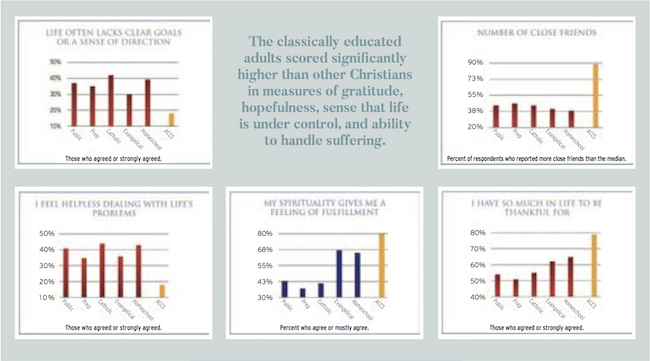CLASSICAL CHRISTIAN EDUCATION ONWARD
The classically educated adults scored significantly higher than other Christians in measures of gratitude, hopefulness, sense that life is under control, and ability to handle suffering.
Gene Veith points out something that impressed me, bothered me, and now intrigues me. Some of the best data in the Good Soil study has to do with “soft” trends like “outlook on life.” Initially, I was in the room when the raw data from Notre Dame came in, and I was so thankful for all the impressive data on “life outlook.” Later, I was bothered by that data because I like things that feel more quantifiable like “church attendance” and “Bible reading.” I did not want to care as much about being well-adjusted and having friends. As I have simmered on this data for a while, I think Veith is right in pointing out the importance of “life outlook.” He states:
What struck me most, though, is the data for “outlook on life”; that is, for their general happiness and mental health. The classically-educated adults scored significantly higher than everyone else in measures of gratitude, hopefulness, sense that life is under control, and ability to handle suffering. They also had more friends, with nearly 90% saying they had more than three close friends, far outstripping the private secular prep schools, which came in second at 50%.
I have stopped looking at these outcomes as “soft” things and started seeing them more like Gene. They are possible harbingers of the health needed to found and sustain Christian families, institutions, and communities.
 TY FISCHER, ACCS Board Director of Strategic Growth, commenting on the post “Research Shows Benefits of a Classical Christian Education” from Cranach, the blog by Gene Veith.
TY FISCHER, ACCS Board Director of Strategic Growth, commenting on the post “Research Shows Benefits of a Classical Christian Education” from Cranach, the blog by Gene Veith.










